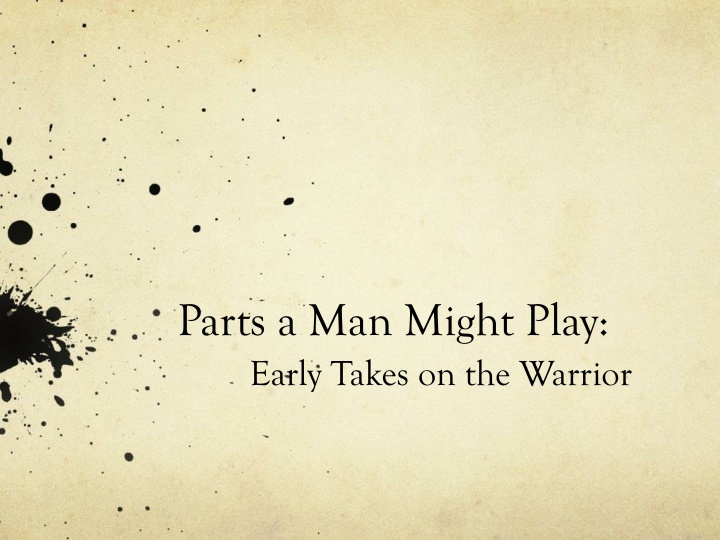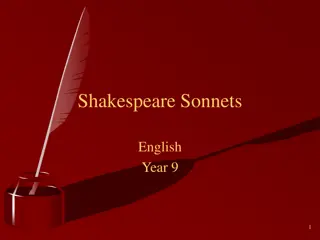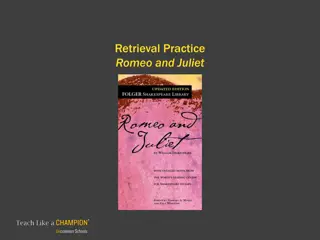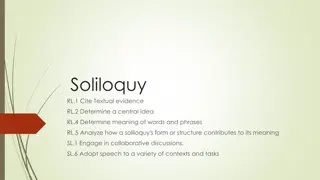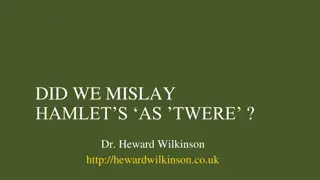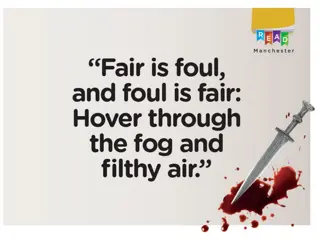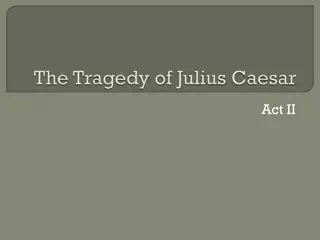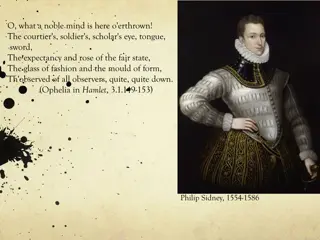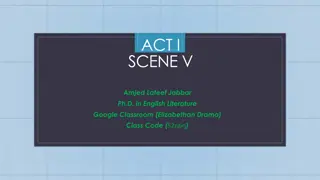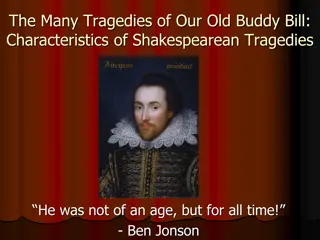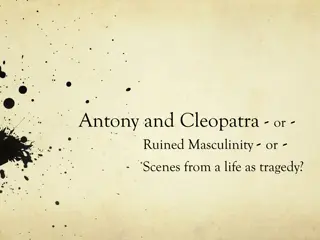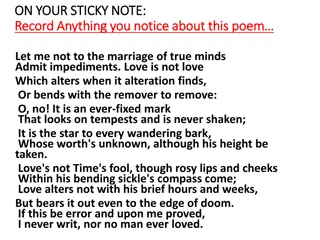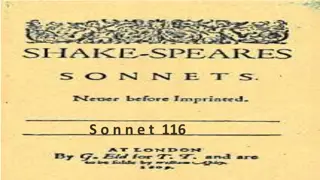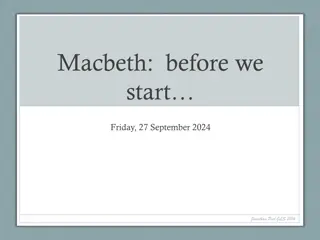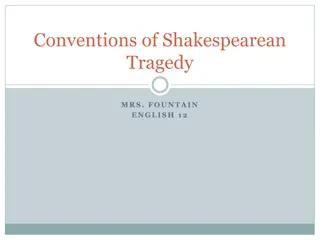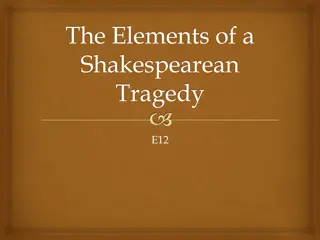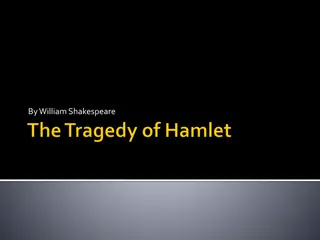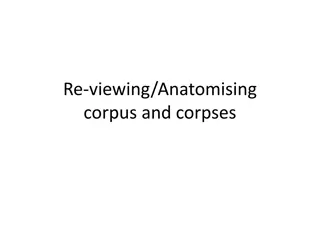Early Takes on the Warrior: Insights from Shakespearean Characters
Explore various perspectives on the role of a warrior through excerpts from Shakespearean plays like Hamlet, Coriolanus, Henry VI, and others. The characters reflect on valor, love for war, courtly duties, and the contrast between peace and war, offering profound insights on the true nature of warfare and the virtues associated with it.
Download Presentation

Please find below an Image/Link to download the presentation.
The content on the website is provided AS IS for your information and personal use only. It may not be sold, licensed, or shared on other websites without obtaining consent from the author.If you encounter any issues during the download, it is possible that the publisher has removed the file from their server.
You are allowed to download the files provided on this website for personal or commercial use, subject to the condition that they are used lawfully. All files are the property of their respective owners.
The content on the website is provided AS IS for your information and personal use only. It may not be sold, licensed, or shared on other websites without obtaining consent from the author.
E N D
Presentation Transcript
Parts a Man Might Play: Early Takes on the Warrior
O, what a noble mind is here o'erthrown! The courtier's, soldier's, scholar's eye, tongue, sword, The expectancy and rose of the fair state, The glass of fashion and the mould of form, Th'observed of all observers, quite, quite down. (Ophelia in Hamlet, 3.1.149-153)
It is held But see William Cecil, Lord Burghley s Advice to his Son : That valour is the chiefest virtue, and Most dignifies the haver. suffer not thy sons to pass the Alps, for they shall learn nothing there but pride, blasphemy, and atheism. And if by travel they get a few broken languages, that shall profit them nothing more than to have one meat served in divers dishes. Neither, by my consent, shalt thou train them up in wars; for he that sets up his rest to live by that profession, can hardly be an honest man or a good Christian; besides it is a science no longer in request than use; for soldiers in peace, are like chimneys in summer. (Cominius in Coriolanus, 2.2.79-81) He that is truly dedicate to war Hath no self love; nor he that loves himself Hath not essentially, but by circumstance, The name of valour. (Young Clifford in 2 Henry VI, 5.3.36-40) O love, That thou couldst see my wars today, and knew'st The royal occupation! Then shouldst thou see A workman in't! (Antony in Antony and Cleopatra, 4.4.15-18)
'I judge the principal and true profession of a Courtier ought to be in feats of arms, the which above all I will have him practise lively, and to be known among other of his hardiness, for his achieving of enterprises, and for his fidelitytoward him whom he serveth.' (Count Ludovico in Baldasar Castiglione's Il Libro del Cortegiano [1528] English edition, The Book of the Courtier [1588]
2nd Servingman: Why, then we shall have a stirring world again. This peace is nothing but to rust iron, increase tailors, and breed ballad-makers. 1st Servingman: Let me have war, say I. It exceeds peace as far as day does night. It's sprightly, waking, audible and full of vent. Peace is a very apoplexy, lethargy; mulled, deaf, sleepy, insensible, a getter of more bastard children than war's a destroyer of men. 2nd Servingman: 'Tis so, and as war in some sort may be said to be a ravisher, so it cannot be denied but peace is a great maker of cuckolds. 1st Servingman: Ay, and it makes men hate one another. 3rd Servingman: Reason, because they then less need one another. The wars for my money Coriolanus (4.6. 215-228)
Early models of the warrior: Titus Andronicus Harry Hotspur For his [honour], it stuck upon him as the sun In the grey vault of heaven, and by his light Did all the chivalry of England move To do brave acts. He was indeed the glass Wherein the noble youth did dress themselves. He had no legs that practised not his gait; And speaking thick, which nature made his blemish, Became the accents of the valiant; For those that could speak low and tardily Would turn their own perfection to abuse To seem like him. So that in speech, in gait, In diet, in affections of delight, In military rules, humours of blood, He was the mark and glass, copy and book That fashioned others. (Lady Percy in 2 Henry IV, 2.2.18-32) Harry Monmouth: Prince Hal Sir John Falstaff [Welsh Women]
Challenge to warrior's self-hood/martial masculinity/virtue 1. Thy beauty hath made me effeminate, And in my temper softened valour's steel. O sweet Juliet, (Romeo in Romeo and Juliet, 3.1.108-110) She has robbed me of my sword. My wife comes foremost... But out affection! All bond and privilege of nature break; Let it be virtuous to be obstinate. What is that curtsy worth? Or those dove's eyes Which can make gods forsworn? I melt, and am not Of stronger earth than others... O, a kiss Long as my exile, sweet as my revenge. (Coriolanus in Coriolanus 5.3.19-44) O thy vile lady, (Antony in Antony and Cleopatra, 4.15.22-23) Ha, what shout is this? ...
Challenge to warrior's self-hood/martial masculinity/virtue ...whether defect of judgement...or whether nature, Not to be other than one thing, not moving From th' casque to th'cushion, but commanding peace Even with the same austerity and garb As he controllled the war ... made him feared, So hated, and so banished. (Aufidius in Coriolanus, 5.1.37-48) Whether 'twas pride... Marcus: Titus Andronicus, the people of Rome... ...name thee in election for the empire... Be candidatus then, and put it on, And help to set a head on headless Rome. Titus: A better head her glorious body fits Than his that shakes for age and feebleness. What, should I don this robe and trouble you? Be chosen with proclamations today, Tomorrow yield up rule, resign my life, And set abroad new business for you all. Rome, I have been thy soldier forty years, And let my country's strength successfully, And buried one-and-twenty valiant sons Knighted in field, slain manfully in arms In right and service of their noble country. Give me a staff of honour for mine age, But not a sceptre to control the world. (Titus Andronicus, 1.1.179 - 199)
Prototype: Tamburlaine in Tamburlaine the Great (1587) From jigging veins of rhyming mother-wits And such conceits as clownage keeps in pay We'll lead you to the stately tent of War Where you shall hear the Scythian Tamburlaine Threat'ning the world with high astounding terms And scourging kingdoms with his conquering sword. View but his picture in this tragic glass, And then applaud his fortunes as you please. Prologue
Conquest 1. Zenocrate (daughter Sultan of Egypt) Zen: Ah, shepherd, pity my distressed plight, If, as thou seem'st, thou art so mean a man... [...] I am, my lord -- for so you do import. Tam: I am a lord, for so my deeds shall prove And yet a shepherd by my parentage... Lie here, ye weeds that I disdain to wear! This complete armour and this curtle-axe Are adjuncts more beseeming Tamburlaine. (1.2.7-43)
Tamburlaine: Disdains Zenocrate to live with me? Or you, my lords, to be my followers? Think you I weigh this treasure more than you? Not all the gold in India's wealthy arms Shall buy the meanest soldier in my train. Zenocrate, lovelier than the love of Jove, Brighter than is silver Rhodope, Fairer than whitest snow on Scythian hills, Thy person is more worth to Tamburlaine Than the possession of the Persian crown, Which gracious stars have promised at my birth. A hundred Tartars shall attend on thee, Mounted on steeds swifter than Pegasus. Thy garments shall be made of Median silk, Enchased with precious jewels of mine own, More rich and valurous than Zenocate's; With milk-white harts upon an ivory sled Thou shalt be drawn amidst the frozen pools And scale the icy mountains' icy tops, Which with thy beauty will be soon resolved; My martial prizes, with five hundred men, Won on the fifty-headed Volga's waves, Shall all we offer to Zenocrate, And then myself to fair Zenocrate. Techelles: What now? In love? Tamburlaine: ... this is she with whom I am in love.
Conquest 2. Tamburlaine: Techelles: Usumcasane: Tamburlaine: Tamburlaine: Theridamas: Theridamas + a thousand Persian horsemen Then shall we fight courageously with them. Or look you I should play the orator? No. Cowards and faint-hearted runaways Look for orations when the foe is near. Our swords shall play the orators for us. Come, let us meet them at the mountain top And with a sudden and an hot alarm Drive all their horses headlong down the hill. Stay, Techelles, ask a parley first. Open the mails, yet guard the treasure sure. Lay out our golden wedges to the view, That their reflections may amaze the Persians. (1.2.128-140) * * * * * Forsake thy king, and do but join with me, And we will triumph over all the world. I hold the Fates bound fast in iron chains And with my hand turn Fortune's wheel about, And sooner shall the sun fall from his sphere Than Tamburlaine be slain or overcome.... Not Hermes, prolocutor to the gods, Could use persuasions more pathetical... But shall I prove a traitor to my king? ... Won with thy words and conquered with thy looks, I yield myself, my men and horse to thee... (1.2.172-229)
Conquest 3. Cosroe Therdidamas: You see, my lord, what working words he hath (2.3.25) Cosroe: Tamburlaine: ...death arrests the organ of my voice, Who, ent'ring at the breach thy sword hath made, Sacks every vein and artier of my heart... My bloodless body waxeth chill and cold, And with my blood my life slides through my wound. (2.7.8-43) * * * * Nature, that framed us of four elements Warring within our breasts for regiment, Doth teach us all to have aspiring minds. Our souls, whose faculties can comprehend The wondrous architecture of the world And measure every wand'ring planet's course, Still climbing after knowledge infinite And always moving as the restless spheres, Wills us to ear ourselves and never rest Until we reach the ripest fruit of all, That perfect bliss and sole felicity The sweet fruition of an earthly crown.(2.7.18-29) * * * *
Mycetes: Accurst be he that first invented war! They knew not, ah, they knew not, simple men, How those were hit by pelting cannon shot Stand staggering like a quivering aspen leaf Fearing the force of Boreas' boist'rous blasts. In what a lamentable case were I If nature had not given me wisdom's lore! For kings are clouts that every man shoots at, Our crowns the pin that thousands seeks to cleave. Therefore in policy I think it good To hide it close -- a goodly stratagem, And far from any man that is a fool. So shall not I be known, or if I be, They cannot take away my crown from me. Here will I hide it in this simple hole. (2.4.1-15)
Conquest 4, 5 6 (Bajazeth, Egypt, Damascus) 'away with them, I say, and show them Death' WORD SWORD SPECTACLE (BATTLE?)
Put the rest to the sword. [Exit Virgins] Ah, fair Zenocrate, divine Zenocrate! Fair is too foul an epithet for thee... Whose sorrows lay more siege unto my soul Than all my army to Damascus' walls; ... What is beauty saith my sufferings, then? If all the pens that ever poets held Had fed the feeling of their masters' thoughts And every sweetness that inspired their hearts, Their minds and muses on admired themes; If all the heavenly quintessence they still From their immortal flowers of poesy, Wherein as in a mirror we perceive The highest reaches of a human wit; If these had made one poem's period And all combined in beauty's worthiness Yet should there hover in their restless heads One though, one grace, one wonder at the least Which into words no virtue can digest. But how unseemly is it for my sex, My discipline of arms and chivalry, My nature and the terror of my name, To harbour thoughts effeminate and faint! ... ...every warrior that is rapt with love Of fame, of valour, and of victory ... Must needs have beauty beat on his conceits [BUT] ...virtue solely is the sum of glory And fashions men with true nobility. (5.1.135-190)
Tamburlaine: And now, my lords and loving followers, That purchased kingdoms by your martial deeds, Cast off your armour, put on scarlet robes, Mount up your royal places of estate, Environed with troops of martial men, And there make laws to rule your provinces Hang up your weapons on Alcides post, For Tamburlaine takes truce with all the world. Thy first betrothed love, Arabia, Shall we with honour, as beseems, entomb, With this great Turk and his fair emperess. Then after all these solemn exequies We will our celebrated rites of marriage solemnize. (Tamburlaine, 5.1.521-533)
